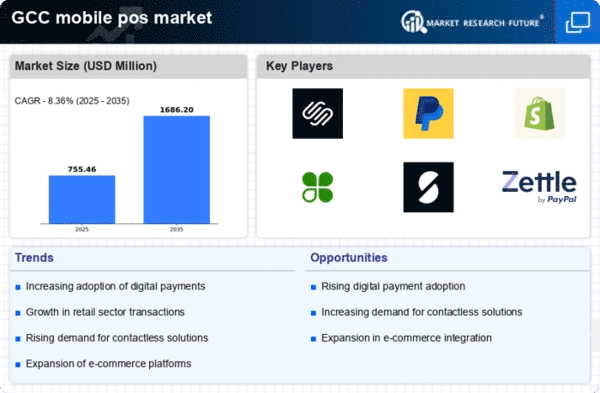Increasing Smartphone Penetration
The proliferation of smartphones in the GCC region is a key driver for the mobile pos market. With smartphone penetration rates exceeding 90% in some GCC countries, businesses are leveraging these devices to enhance their payment processing capabilities. The convenience of using smartphones for transactions is appealing to both consumers and merchants. As a result, the mobile pos market is likely to witness substantial growth, with estimates suggesting a CAGR of 15% over the next five years. This trend indicates that businesses are increasingly adopting mobile pos solutions to cater to the tech-savvy consumer base, thereby transforming the retail landscape in the GCC.
Shift Towards Cashless Transactions
The mobile pos market is benefiting from a notable shift towards cashless transactions in the GCC. Governments in the region are actively promoting digital payment solutions to enhance financial inclusion and reduce reliance on cash. This initiative aligns with the broader economic goals of diversifying economies and fostering innovation. As a result, the mobile pos market is expected to expand, with a projected growth rate of 20% annually. The increasing acceptance of digital payments among consumers and businesses alike indicates a strong potential for mobile pos systems to thrive in this evolving landscape.
Growing Demand for Retail Automation
The mobile pos market is being propelled by the growing demand for retail automation in the GCC. Retailers are increasingly seeking solutions that streamline operations and enhance customer engagement. Mobile pos systems offer features such as inventory management and real-time sales analytics, which are crucial for modern retail environments. As businesses strive to improve efficiency and customer satisfaction, the adoption of mobile pos technology is likely to rise. Recent statistics indicate that the retail automation market in the GCC is expected to grow by 25% over the next three years, further underscoring the potential for mobile pos market expansion.
Enhanced Customer Experience Expectations
The mobile pos market is significantly influenced by evolving customer experience expectations in the GCC. Consumers are increasingly seeking faster, more convenient payment options that align with their digital lifestyles. Mobile pos systems cater to these demands by providing quick transaction processing and personalized service. As businesses recognize the importance of enhancing customer experiences, they are likely to invest in mobile pos solutions. Market analysis suggests that companies prioritizing customer experience are 60% more likely to adopt mobile pos technology, indicating a strong correlation between customer expectations and market growth.
Technological Advancements in Payment Solutions
The mobile pos market is experiencing a surge due to rapid technological advancements in payment solutions. Innovations such as Near Field Communication (NFC) and mobile wallets are becoming increasingly prevalent in the GCC region. These technologies facilitate seamless transactions, enhancing customer experience and operational efficiency. As businesses adopt these advanced solutions, the mobile pos market is projected to grow significantly. According to recent data, the adoption of NFC technology in the GCC is expected to reach 60% by 2026, indicating a robust shift towards modern payment methods. This trend suggests that businesses are likely to invest more in mobile pos systems to remain competitive, thereby driving growth in the mobile pos market.
















